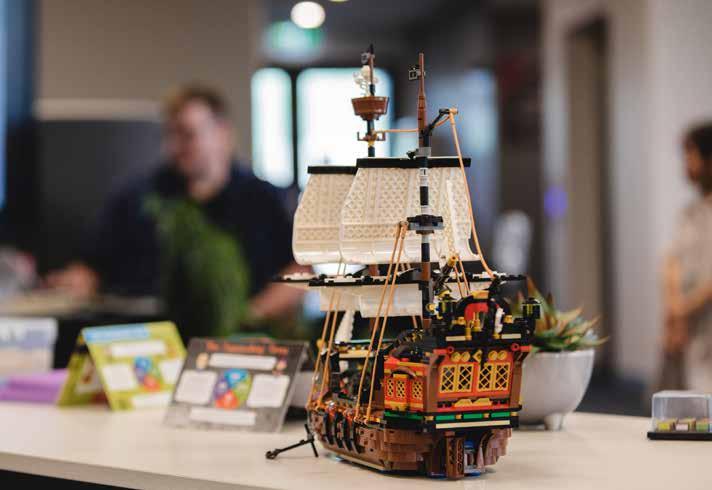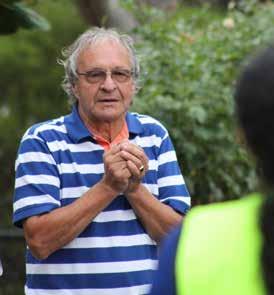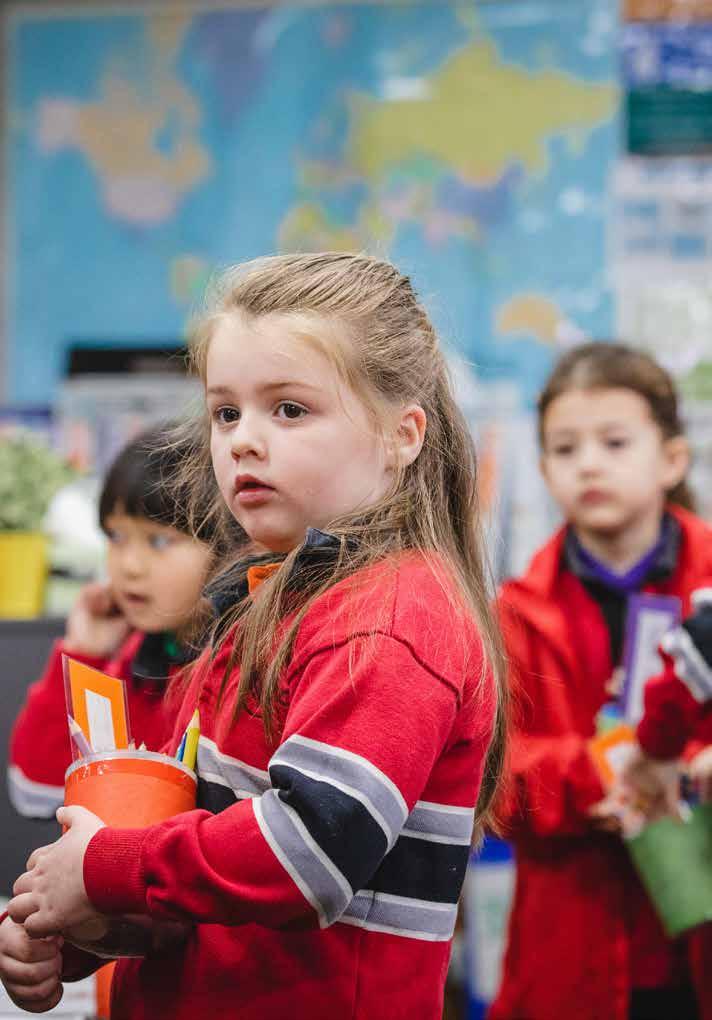
9 minute read
Child Safe Standard 5
Child Safe Standard 5 – Equity is upheld and diverse needs respected in policy and practice.
In complying with Child Safe Standard 5, an organisation must, at a minimum, ensure: 5.1 The organisation, including staff and volunteers, understands children and young people’s diverse circumstances, and provides support and responds to those who are vulnerable.
5.2 Children and young people have access to information, support and complaints processes in ways that are culturally safe, accessible and easy to understand.
5.3 The organisation pays particular attention to the needs of children and young people with disability, children and young people from culturally and linguistically diverse backgrounds, those who are unable to live at home, and lesbian, gay, bisexual, transgender and intersex children and young people.
5.4 The organisation pays particular attention to the needs of Aboriginal children and young people and provides/ promotes a culturally safe environment for them.
Source
Commission for Children and Young People. (2021, July 1). New Child Safe Standards start in Victoria on 1 July 2022 to better protect children. https://ccyp.vic.gov.au/news/new-child-safe-standards-start-in-victoria-on-1-july-2022-tobetter-protect-children/
Diversity and equity
9.1 Schools and school boarding premises must ensure that equity is upheld, and diverse needs respected in policy and practice.
9.2 In complying with clause 9.1, the school governing authority or school boarding premises governing authority must, at a minimum, ensure: a. The school or school boarding premises, including staff and volunteers, understands the diverse circumstances of children and students, and provides support and responds to vulnerable children and students.
b. Children, students, staff, volunteers and the school community or school boarding premises community have access to information, support and complaints processes in ways that are culturally safe, accessible and easy to understand. c. The school or school boarding premises pays particular attention to the needs of students with disability, students from culturally and linguistically diverse backgrounds, students who are unable to live at home, international students, and lesbian, gay, bisexual, trans and gender diverse, intersex and queer (LGBTIQ+) students. d. The school or school boarding premises pays particular attention to the needs of Aboriginal students and provides and promotes a culturally safe environment for them.
Explanatory notes:
There are many ways that school staff or school boarding premises staff can determine if a child or student is vulnerable. Vulnerable children and students may include, but are not limited to, children or students who:
a. Are deemed vulnerable by a government agency, funded family service or family violence service, or assessed as requiring education and care outside the family home.
b. Are identified as vulnerable as a result of a referral from a government agency, funded family service or family violence service, homeless or youth justice service; or mental health or other health service.
c. Self-identify or are identified by school staff or school boarding premises staff as a member of a vulnerable cohort (for example Aboriginal children and students; children and students with disability; children and students from culturally and linguistically diverse backgrounds; children and students who are unable to live at home or are in out- of-home care; international students; and children and students who are lesbian, gay, bisexual, trans and gender diverse, intersex and queer (LGBTIQ+).
Schools and school boarding premises may also need to consider a range of other factors beyond those listed above when determining whether a child or student is vulnerable.
9.3 The school governing authority or school boarding premises governing authority must develop and endorse a policy, statement or curriculum document that details the strategies and actions the school or school boarding premises will take to implement clauses 9.1 and 9.2.
The Child Safe Standards have always required organisations to recognise and respond to diversity and understand that some children are more vulnerable to abuse than others. This requirement is was previously captured in three overarching principles promoting the: • Cultural safety of Aboriginal children. • Cultural safety of children from culturally and/or linguistically diverse backgrounds. • Safety of children with disability.
The new Child Safe Standard 5 has requirements for organisations that are similar to the current Standards to: • Be aware of, and sensitive to, the diverse backgrounds, circumstances and needs of Aboriginal children and young people, culturally and/or linguistically diverse children and young people and children and young people with disability. • Attend to any adjustments to provide equal protection for all children and young people.
However, the new Child Safe Standard 5 creates additional specific obligations on organisations, including their staff and volunteers, to: • Give particular attention to the needs of children and young people who identify as lesbian, gay, bisexual, transgender or intersex. • Give particular attention to the needs of children and young people unable to live at home (for example children and young people in out of home care or custodial settings).
Given the new Standard’s focus on understanding children’s diverse circumstances, organisations will also need to give attention to the needs of non-binary and gender diverse children. Organisations must ensure they provide children and young people with access to information, support and complaints processes that are culturally safe and easy to understand.
Source
Commission for Children and Young People. (2021b, July 1, p. 3). What’s changing?: Compare current and new Child Safe Standards. https://ccyp.vic.gov.au/assets/resources/New-Standards/Whats-changing-comparison-of-currentand-new-Child-Safe-Standards.pdf
Northside Christian College has commenced implementing a range of strategies to support staff and volunteers in developing a greater awareness of the people’s diverse circumstances, including students who are vulnerable.
Strategies to support the under anding of udents who are vulnerable
The College’s Grievance and Complaints Management Policy (Policy No. 24) is published on the College website. An extract is also published in the student diary.
Senior School students in Years 11 and 12 are supported by a member of staff who is a mentor.
Students have access to the Colleg’s Student Wellbeing Team, including the Child Safety Officer.
Posters about the Colleg’s Child Safety Officer and Child Protection Workers are displayed around the College.
Information about the College’s Child Safety Policy and Grievance and Complaints Management Policy are published in the College diary for students.
Additional resources are published on the College website for student access.
5.3 The organisation pays particular attention to the needs of children and young people with disability, children and young people from culturally and linguistically diverse backgrounds, those who are unable to live at home, and lesbian, gay, bisexual, transgender and intersex children and young people.
At Northside Christian College, a wide range of policies address the needs of children and young people with disability, children and young people from culturally and linguistically diverse backgrounds, those who are unable to live at home, and lesbian, gay, bisexual, transgender and intersex children and young people.
Pastoral Care Policy Child Safety Policy
Behaviour Management Policy
Student AntiHarassment and Bullying Policy Inclusive Education Policy
Action Items
Action: Consider additional ways to support lesbian, gay, bisexual, transgender and intersex children and young people to feel safe and respected at Northside Christian College, including the development of supporting policies and procedures.
Action Plan Key: In Place Partially in Place Not in Place
Northside Christian College is committed to strategically and practically building a culture which acknowledges, affirms and celebrates Aboriginal and Torres Strait Islander peoples, cultures and traditions.
Below are some of the strategies implemented to support with creating a culturally safe environment for Aboriginal and Torres Strait Islander students at Northside.
Aboriginal and Torres Strait Islander Flags
The College flies the the Aboriginal and Torres Strait Islander flag at Northside to demonstrate our pride and respect for the histories, cultures and contributions of Australia’s First Peoples. Flying or displaying the flags promotes a sense of community partnership and a commitment toward reconciliation.
Acknowledgement of Country
An Acknowledgement of Country is an act of respect for the continuing connection of Aboriginal or Torres Strait Islander Traditional Owners and Custodians to the land on Northside Christian College stands. The College community is encouraged to share an Acknowledgement of Country at meetings and events throughout the year.
Cultural Safety Policy
The College has developed a Cultural Safety Policy (Policy No. 74) during 2022. The policy outlines the College’s commitment to establishing and maintaining culturally safe environments in which the diverse and unique identities and experiences of all students and members of the College community are respected and valued, including Aboriginal children, young people and students. The College acknowledges that this policy applies even if there may not be any Aboriginal or Torres Strait Islander children at the College.
Harmony Day
Harmony Day is celebrated annually at Northside Christian College. This event provided the College community with an opportunity to celebrate inclusiveness, respect and belonging for all Australians, regardless of cultural or linguistic background, united by a set of core Australian values. On Harmony Day, students, staff, and parents wear either the traditional dress of different nations or the colour orange.
Welcome to Country
Northside Christian College has recently commenced incorporating a Welcome to Country as part of the College’s Dedication Service at the commencement of each school year. Protocols for welcoming visitors to Country have been a part of Aboriginal and Torres Strait Islander cultures for thousands of years. Incorporating these protocols into formal events and important occasions recognises Aboriginal and Torres Strait Islander peoples as the First Australians and Custodians of their Land.
For additional information about strategies to support with creating a culturally safe environment for Aboriginal and Torres Strait Islander students at Northside please refer to www.narragunnawali.org.au
Image: Uncle Ian Hunter, Wurrundjeri elder, sharing with the College Community at a Dedication Service.

Action: Consider the development of inclusive policies to address the needs of Aboriginal children and young people.
Staff in schools and early learning services should be aware of policies that refer specifically to improving educational outcomes for Aboriginal and Torres Strait Islander people and increasing knowledge of, and respect for, Aboriginal and Torres Strait Islander histories and cultures in Australia. Planning how to ensure all staff comply with these policies in their daily practice is important. Where possible, internal policies should be reviewed and amended to ensure they are also inclusive of Aboriginal and Torres Strait Islander people and increase knowledge of Aboriginal and Torres Strait Islander histories and cultures in Australia.
Action: Develop additional strategies to take action against racism.
Racism can have serious negative physical and psychological consequences for the people who experience it, and for wider society. Understanding racism is an essential first step in overcoming it. Schools and early learning services can take action to counter racism by building awareness of racism, its impacts, and how to respond effectively to racism.
Action: Provide professional learning opportunities for staff to develop cultural competence.
Schools and early learning services should reflect on their current level of cultural competence and provide staff with a range of opportunities to build and extend their knowledge and understanding of Aboriginal and Torres Strait Islander cultures.
Response: The College is currently investigating the resources published by Australian’s Together, which is outlined in more detail at: https://australianstogether.org.au/professional-learning/
Action: Celebrate National Reconciliation Week.
There is an opportunity to celebrate National Reconciliation Week (NRW) from 27th May to 3rd June each year. NRW is a time to celebrate and build on the respectful relationships shared by Aboriginal and Torres Strait Islander people and the wider community. Talk about reconciliation in the classroom and staffroom, host and attend events and activities for everyone in your school or early learning service community.
Action Plan Key: In Place Partially in Place Not in Place









